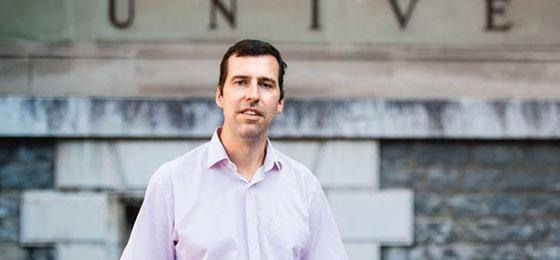"In Switzerland, the history of decolonisation is less politicised than it is elsewhere"

Alexander Keese is a specialist in African history and is being awarded the 2016 National Latsis Prize for his analyses of decolonisation. By Benjamin Keller
(From "Horizons" no. 111 December 2016)
In his office, Alexander Keese's research is on display in the form of a statue from Angola and a series of photos of the archipelago of Sao Tomé and Principe – representing two former Portuguese colonies in Africa. Keese is a specialist in the comparative history of decolonisation in western and central Africa, and forced labour and ethnic mobilisation during conflicts. He is a recipient of an SNSF bursary and has worked in the General History Department of the University of Geneva since 2015. He is about to receive the National Latsis Prize. Keese is a 39-year-old German national and he accepted Horizons' invitation to an interview in French, one of the six languages that he speaks.
How did you react to the news?
I was completely surprised. I thought it was very rare to award the prize to a historian. Of course, global history is fashionable these days, but it's not often in the running for a prize like this one. What's more is that my projects tend to start out from a very vast problem and only later identify more specific questions. For me, this is the best approach, but in many countries there is pressure to provide responses before even having carried out research… I think it is also quite unusual to have been named without having spent my entire career in Switzerland.
What is the basis for your work?
There are three pillars: the history of decolonisation, forced labour and issues of ethnicity. On ethnicity, for example – something which is often used to explain everything that happens in Africa – my work has shown a relative importance. In other words, we might say that the more stable the situation is, the less this is a factor.
And what about the other two pillars?
I've looked at the integration of African elites in the decolonisation process. There I found they were almost never appointed to positions of real responsibility in the colonial administration. Instead they were integrated informally, taking up posts such as counsellors. Their growing influence led them to call for independence, a move which eventually led to decolonisation… With regard to forced labour, I found evidence of a return to these practices by colonial states in brutal forms between the end of the 19th century and the first half of the 20th century, a period otherwise known for its good labour practices.
The history of decolonisation has been studied on the political level to a great extent; however, you are one of the few who look at the social situations of populations. Why is that?
It's difficult to access the archives. And when it comes to witnesses, they are either old or dead. One other problem is the highly politicised nature of the topic. Often, the current political climate will cause versions of the facts to vary. The past gets reinterpreted.
And how do you work?
Historians generally have two approaches: carrying out interviews on the ground or using archives. In my current work, I am relying more on the second method. These involve classical sources such as administrative documents, but they are not easy to find and are often in a shocking state.
How do you feel in Geneva?
I'm happy to be in one of the key places of global history, rubbing shoulders with specialists from every part of the world. Then there's the fact that decolonisation is much less politicised in Switzerland than elsewhere in Europe. It's much easier to talk about it. Switzerland is also very interesting because it is open to the European languages spoken in Africa.
Benjamin Keller is a freelance journalist and currently lives in Cairo.
Video interview and pictures of his research: www.snsf.ch/latsis
The 2016 National Latsis prize
The 2016 National Latsis prize Since 1983 the Latsis Prize has been awarded by the SNSF, under the auspices of the International Latsis Foundation in Geneva. The prize money is CHF 100,000 and goes to a researcher under 40 years old whose work is considered exceptional and who conducts research in Switzerland. The 2016 recipient Alexander Keese was born in Hanover in 1977. He did his doctoral degree at the University of Freiburg im Breisgau and his post-doctoral habilitation at the University of Bern. He also conducted research at the University of Porto and at the Humboldt University of Berlin before coming to Geneva in 2015. He is married.